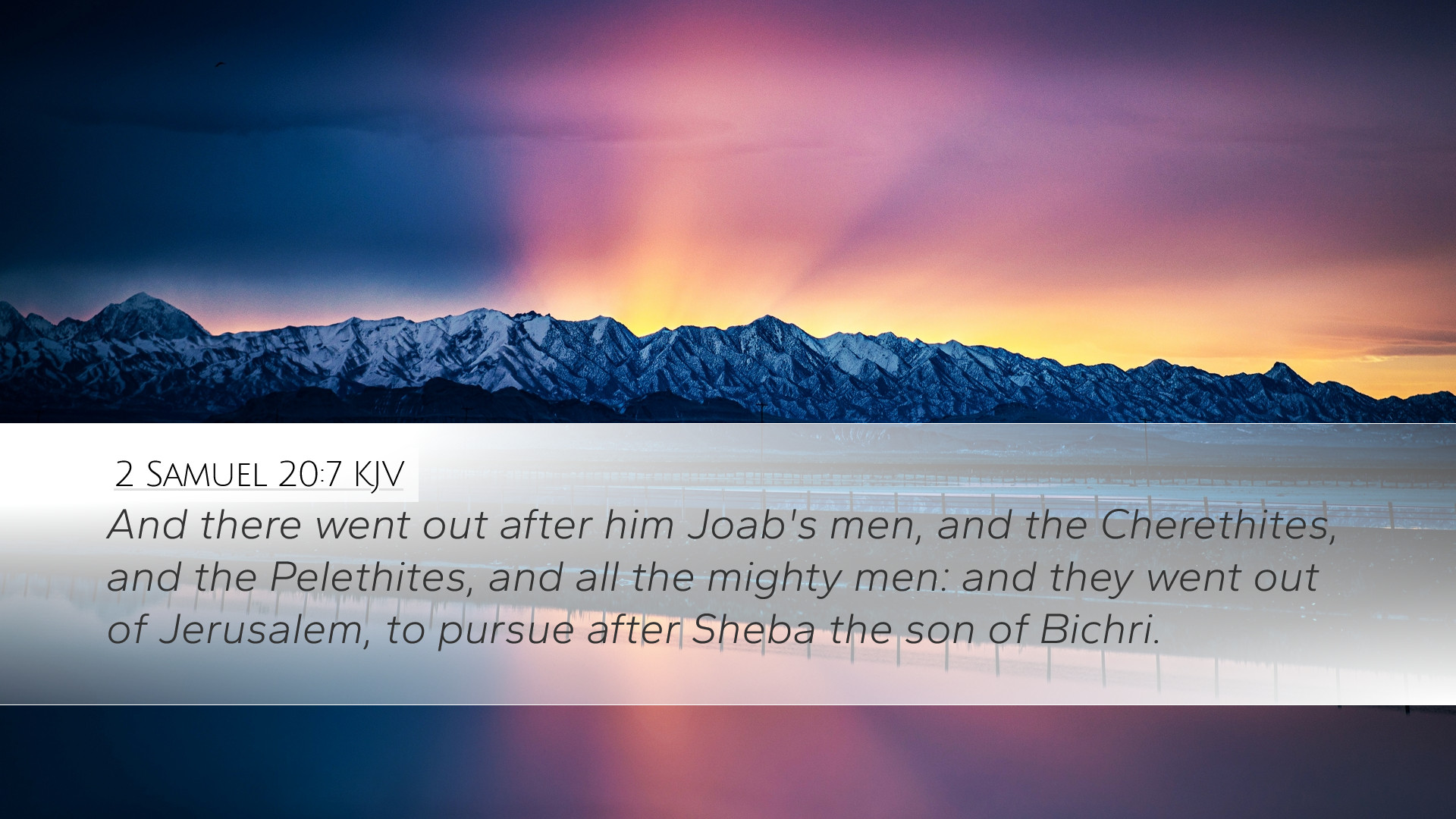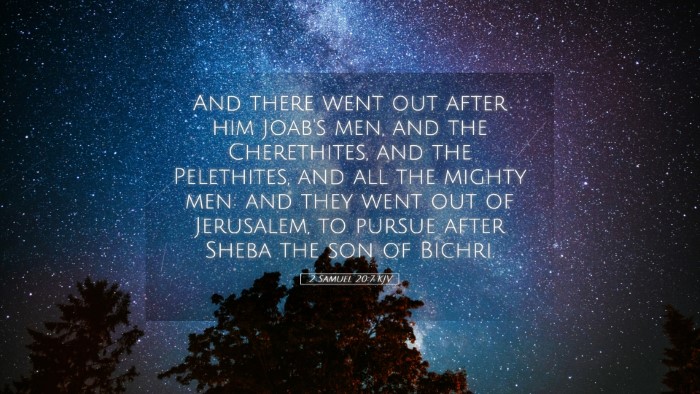Commentary on 2 Samuel 20:7
The verse 2 Samuel 20:7 reads: "So they went out after him, and sent out the chosen men which were with him." (KJV)
In this passage, we witness an episode from the complex narrative of David's reign and the consequences of Absalom's rebellion. As we delve into this text, we will glean insights from various public domain commentaries, combining the perspectives of Matthew Henry, Albert Barnes, and Adam Clarke.
Contextual Overview
The context of 2 Samuel 20 involves the aftermath of Absalom's revolt and the resulting strife within Israel. Sheba, the son of Bichri, emerges as a new challenger, leading a rebellion against David. This verse marks a critical moment as David sends out his forces to pursue Sheba and quell the threat to his kingdom.
Commentary Insights
Matthew Henry's Commentary
Matthew Henry emphasizes the significance of leadership and the necessity of swift action in times of conflict. Henry observes:
-
David's Response to Rebellion: He notes that David recognizes the urgency of the situation and does not hesitate to mobilize his troops. This reflects a wise and decisive leader who understands the fragility of his position.
-
The Role of the "Chosen Men": Henry highlights the importance of having trusted and skilled men in leadership roles, as they play a vital part in the efficacy of military action. The "chosen men" imply both a selection based on loyalty and capability—qualities essential in the face of civil unrest.
Albert Barnes' Commentary
Albert Barnes provides additional layers of meaning surrounding the actions taken by David and the implications of the military response:
-
The Nature of Sheba's Rebellion: Barnes delves into Sheba’s background and his motivations for inciting rebellion. Sheba represents the discord that can arise from personal grievances against David’s rule, a reminder of the instability resulting from the previous tumult.
-
The Strategy of Pursuit: Barnes points out that David’s sending forth the "chosen men" was not merely an act of retaliation but also a strategic move to prevent the insurgence from gaining momentum. This also serves to unify loyal factions under one banner to restore order.
-
Lessons for Leadership: Barnes underscores the importance of decisive leadership in maintaining authority, suggesting that a leader must not only act but also do so promptly to discourage further rebellion.
Adam Clarke's Commentary
Adam Clarke offers a nuanced interpretation, particularly focusing on the implications of division within the kingdom:
-
Symbolism of "Chosen Men": Clarke explains that the term "chosen men" signifies those who are selected based on their merit and loyalty. In times of crisis, such men are vital for support and reinforcement, which can lead to eventual success in restoring peace.
-
Reflection on Political Dynamics: Clarke explores the political complexity of David’s reign, where loyalty is often tested. The pursuit of Sheba serves as a microcosm of the larger political landscape within Israel, showcasing the constant struggles for power.
-
Theological Implication: Clarke ties the narrative back to theological themes, suggesting that these conflicts are permissive under divine providence to ultimately highlight God's sovereignty in human affairs. David's military actions illustrate the divine mandate to preserve order in the kingdom.
Practical Applications
As pastors, students, and theologians reflect on this passage, several practical applications may emerge:
-
Leadership and Decision-Making: The necessity of taking decisive action in leadership cannot be overstated. Leaders are called upon to make tough decisions while weighing the consequences of their actions.
-
Unity in Diversity: The presence of "chosen men" illustrates the importance of unity in pursuing common goals. In contemporary church leadership, fostering a team of diverse talents while maintaining a shared vision is crucial.
-
Spiritual Warfare: The narrative serves as a reminder that spiritual warfare exists, where factions may arise within communities or congregations. The call to pursue peace and combat division resonates in today’s context.
-
Your Call to Action: Just as David mobilized a response, believers are called to actively engage in promoting unity and addressing conflicts within their spheres of influence.
Conclusion
2 Samuel 20:7 encapsulates a moment of critical action amid turmoil. The combined insights from Matthew Henry, Albert Barnes, and Adam Clarke provide a comprehensive understanding of the verse's multifaceted implications for leadership, loyalty, and divine sovereignty. The timeless lessons drawn from this text continue to resonate within the church today, reminding us of the call to act decisively for the sake of unity and the pursuit of God's kingdom.


